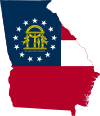The Georgia (U.S. state) PortalGeorgia /ˈdʒɔːrdʒə/ is a state located in the southeastern United States. It was established in 1732, the last of the original Thirteen Colonies. Named after King George II of Great Britain, Georgia was the fourth state to ratify the United States Constitution, on January 2, 1788. It declared its secession from the Union on January 21, 1861, and was one of the original seven Confederate states. It was the last state to be restored to the Union, on July 15, 1870. Georgia is the 24th most extensive and the 8th most populous of the 50 United States. From 2007 to 2008, 14 of Georgia's counties ranked among the nation's 100 fastest-growing, second only to Texas. Georgia is known as the Peach State and the Empire State of the South. Atlanta is the state's capital and its most populous city. Georgia is bordered on the south by Florida; on the east by the Atlantic Ocean and South Carolina; on the west by Alabama; and on the north by Tennessee and North Carolina. The northern part of the state is in the Blue Ridge Mountains, a mountain range in the vast Appalachian Mountains system. The central piedmont extends from the foothills to the fall line, where the rivers cascade down in elevation to the continental coastal plain of the southern part of the state. The highest point in Georgia is Brasstown Bald, 4,784 feet (1,458 m); the lowest point is the Atlantic Ocean. Georgia is the most extensive state east of the Mississippi River in terms of land area, although it is the fourth most extensive (after Michigan, Florida, and Wisconsin) in total area, a term which includes expanses of water which are part of state territory.
Selected article -ATL is a 2006 American drama film, and the feature film directorial debut of music video director Chris Robinson. The screenplay was written by Tina Gordon Chism from an original story by Antwone Fisher, and is loosely based on the experiences of the film's producers Dallas Austin and Tionne "T-Boz" Watkins (of the R&B group TLC) growing up in Atlanta, Georgia. The film is a coming-of-age tale concerning Rashad, played by rap artist T.I. in his film debut, and his friends in their final year in high school and on the verge of adulthood. The film also stars Antwan Andre Patton, aka Big Boi of the rap group OutKast, Evan Ross, Jackie Long, Lauren London, and Mykelti Williamson. ATL was the first feature film produced by its director and the majority of its cast. Filming took place during the summer over a forty-five day schedule in Atlanta. As the film was produced in Atlanta, director Chris Robinson was able to get many celebrities from the city to make cameo appearances, including Jazze Pha, Killer Mike, and Monica. ATL opened on March 31, 2006, and on its opening weekend the film grossed a total of $11,554,404, ranking third in the U.S. box office. It eventually went on to gross approximately $21 million, replenishing the film's $20 million budget. ATL received generally favorable reviews from critics, and was nominated for numerous awards. Selected picture - Credit: Gordon P. Hemsley
The Mary Ray Memorial School is located on Raymond Sheddan Avenue in Raymond, Georgia. It was listed on the National Register of Historic Places on July 23, 2013. State facts
State symbols:
Selected biography -Tyrus Raymond Cobb (December 18, 1886 – July 17, 1961), nicknamed The Georgia Peach, was an American Major League Baseball (MLB) outfielder. He was born in rural Narrows, Georgia. Cobb spent 22 seasons with the Detroit Tigers, the last six as the team's player-manager, and finished his career with the Philadelphia Athletics. In 1936 Cobb received the most votes of any player on the inaugural Baseball Hall of Fame ballot, receiving 222 out of a possible 226 votes (98.2%); no other player received a higher percentage of votes until Tom Seaver in 1992. In 1999, editors at the Sporting News ranked Ty Cobb 3rd on their list of "Baseball's 100 Greatest Players". Selected anniversaries for July
Did you know -
CategoriesSelect [►] to view subcategories
WikiProjects
What are WikiProjects? Selected panoramaCredit: DarkEvil
Panoramic view of the Atlanta skyline, spanning from Midtown on the left to Downtown on right. Selected quoteQuality content
Featured articlesFeatured lists
Featured pictures
TopicsThings you can doedit · history · watch · purge Related portalsAssociated WikimediaThe following Wikimedia Foundation sister projects provide more on this subject:
Discover Wikipedia using portals |





























